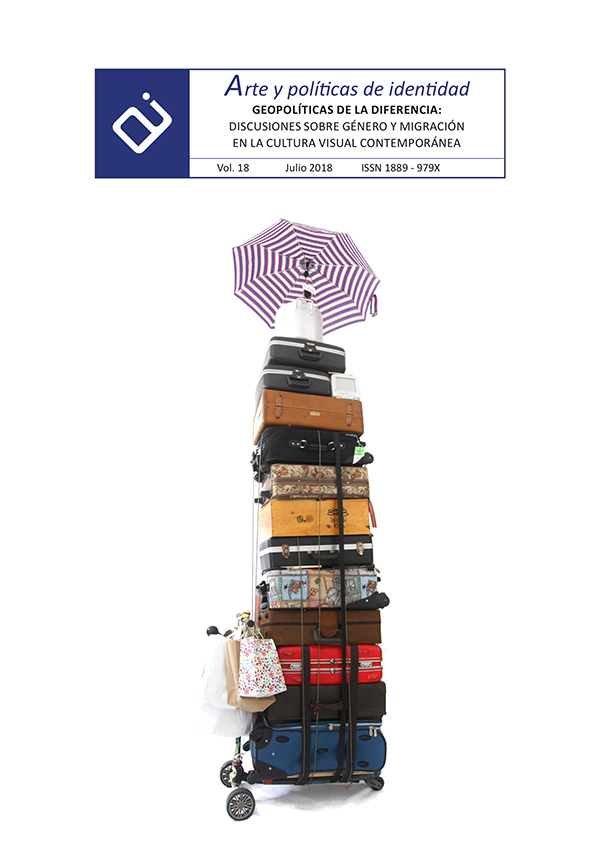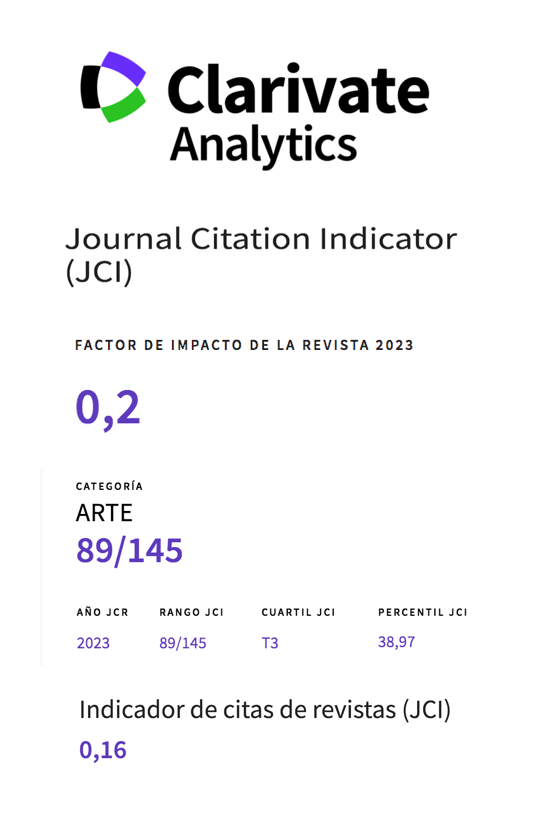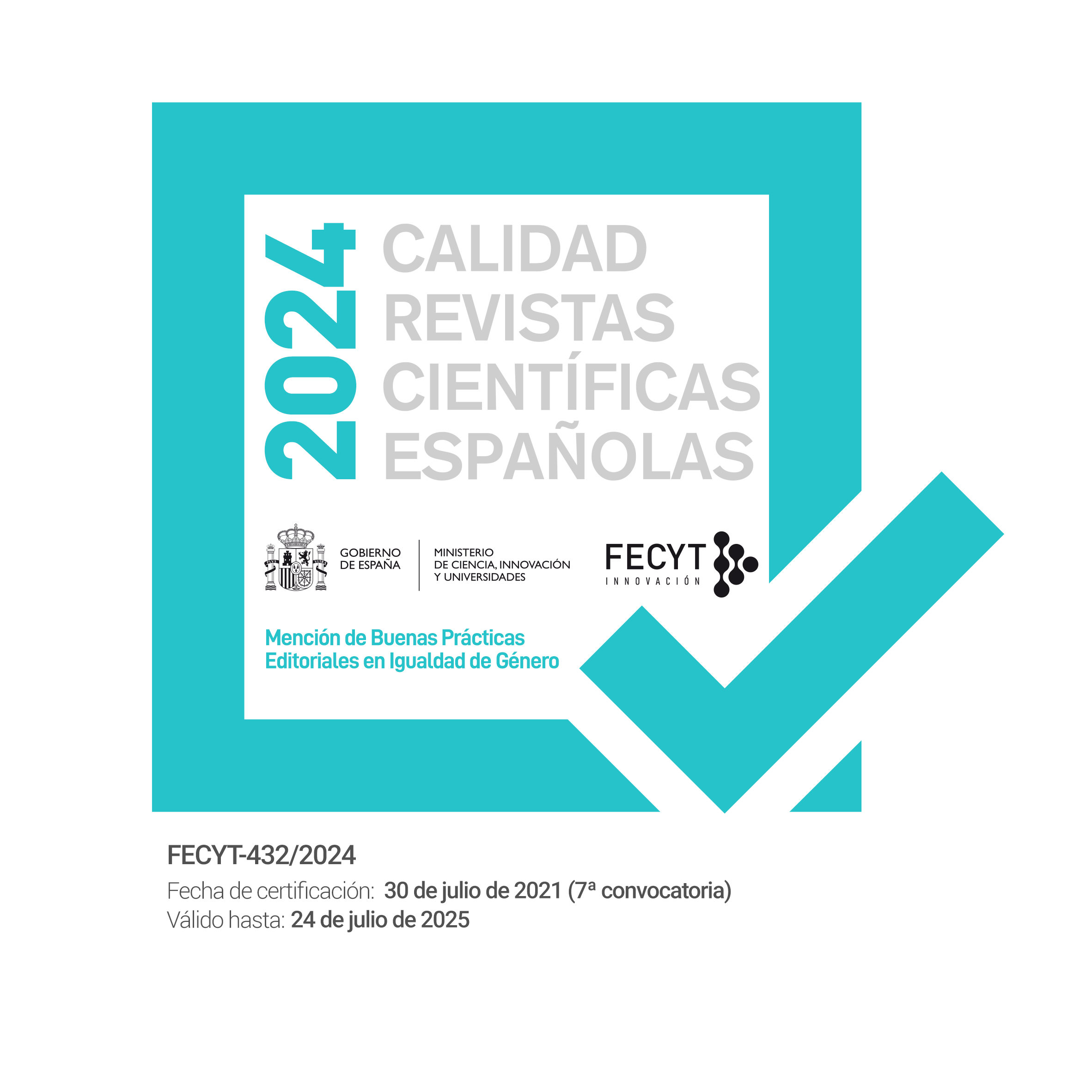Queer Exile, Gender Invisibility and Public Art
Abstract
Women from Sub-Saharan Africa, lesbian or otherwise, including asylum seekers, migrants or European nationals, women who love other women in African countries, where you give your life, face circumcision or rape for love; advocacy organizations working with these groups, on a European or national level; female, queer, feminist and black artists; these were the stakeholders sought out by Toxic Lesbian during the artist’s residence in El Ranchito, Matadero, Madrid to develop this project in a public and process art format between 2011 and 2012. It received support from general human rights organizations, refugees and migrants, gender-specific ones or LGBTQ associations. The aim of the research project is to present the findings on the reasons why queer Africans and, more specifically, women, emigrate. It will look at existing forms of discrimination during the queer diasporas, who left due to their sexual orientation and gender, as well as those within international institutions which are supposed to ensure the enforcement of right to asylum legislation. Similarly, it will be shown images of the creative processes implemented in this respect through public art, with cooperation from partner institutions and members of the population featured in the project overseen by the artist.
Downloads
-
Abstract1216
-
PDF (Español (España))739
References
ACNUR. (2017). Los solicitantes de asilo LGBTI encuentran seguridad en Madrid. ACNUR. Recuperado de: http://www.acnur.org/es-es/noticias/noticias-de-espana/2903-solicitantes-de-asilo-lgtbi-encuentran-seguridad-en-madrid
Aljazeera TV. [@toxiclesbian]. (11 febrero 2011). Corrective Rape and Murder continues in South Africa [Archivo de video]. Recuperado de: https://www.youtube.com/watch?v=124cs9Rr5QI&index=22&list=PL3101C84E0F895F9E
Amnistía Internacional. [@toxiclesbian]. (2011). La lucha por la igualdad del colectivo LGTBI retrocede en Honduras, Sudáfrica y Camerún [Archivo de vídeo]. Recuperado de: https://www.es.amnesty.org/en-que-estamos/noticias/noticia/articulo/la-lucha-por-la-igualdad-del-colectivo-lgtbi-retrocede-en-honduras-sudafrica-y-camerun/
Ares, L., Ortega, E., Navarra, P., Romero, C. y Thiam, S. [@toxiclesbian]. (2011). Diálogos Abiertos sobre asilo y migración desde la perspectiva de género y orientación sexual de mujeres y de lesbianas con procedencia africana [Archivo de vídeo]. Recuperado de: https://www.youtube.com/watch?v=Bwhq5t4i2QM&list=PL3101C84E0F895F9E&index=8
De Jesús, G., Gouffrau, C. [@toxiclesbian]. (2011). Diálogos Abiertos sobre asilo y migración desde la perspectiva de género y orientación sexual de mujeres y de lesbianas con procedencia africana [Archivo de vídeo]. Recuperado de: https://www.youtube.com/watch?v=t21NuXqrmq0&index=13&list=PL3101C84E0F895F9E
Dionne, K. (2013). Attitudes towards homosexuality in Sub-Saharan Africa. Pennsylvania University. Recuperado de: https://www.researchgate.net/publication/256058169_Attitudes_Toward_Homosexuality_in_Sub-Saharan_Africa
Eric. [@toxiclesbian]. (2010). Entrevista con Eric, gay demandante de asilo [Archivo de vídeo]. Recuperado de: https://www.youtube.com/watch?v=X9TcoK1BR80
Eric, Marianna, Muholi, y Rachel. [@toxiclesbian]. (2011). Resumen entrevistas y diálogos abiertos Matadero [Archivo de vídeo]. Recuperado de: http://toxiclesbian.org/wp-content/uploads/2017/10/Resumen-Entrevistas-y-Dialogos-abiertos-Matadero-2011.pdf
Davis, A. (1981). Femmes, race et classe. Paris: Antoinette Fouque.
Human Rights Watch. (2017) España: solicitantes de asilo sufren abusos en enclave del norte de África. Human Rights Watch. Recuperado de: https://www.hrw.org/es/news/2017/04/28/espana-solicitantes-de-asilo-lgbt-sufren-abusos-en-enclave-del-norte-de-africa
Jansen, S. Spijkerboer, T. (2011). Fleeing homophobia: demandes d’asile liées à l’orientation sexuelle et à l’identité sexuelle en Europe. Amsterdam: Vrije Universiteit Amsterdam. Recuperado de: https://www.rechten.vu.nl/nl/Images/web_110098_FH_FR_tcm247-243075.pdf
Kemmis, S. y McTaggart, R. (1988). Cómo planificar la investigación-Acción. Barcelona: Laertes.
Kobelinsky, C. (2012) L’asile gay: jurisprudence de l’intime à la cour nationale du droit d’asile. Droit et Société, 82, 583-601. Recuperado de:https://www.cairn.info/revue-droit-et-societe-2012-3-page-583.html
Marianna. [@toxiclesbian]. (2011). Entrevista con Marianna, lesbiana demandante de asilo de Senegal [Archivo de vídeo]. Recuperado de: https://www.youtube.com/watch?v=nwycBwDiByM&index=9&list=PL3101C84E0F895F9E
Muholi, Z. [@toxiclesbian]. (2011). Entrevista con Zanele Muholi [Archivo de vídeo]. Recuperado de https://youtu.be/OHmdPIgO47g?list=PL3101C84E0F895F9E
Platero, R. L. (Ed.). (2012). Intersecciones: cuerpos y sexualidades en la encrucijada. Barcelona: Ediciones Bellaterra.
Rachel, [@toxiclesbian]. (2010). Entrevista con Rachel, lesbiana demandante de asilo africana [Archivo de vídeo]. Recuperado de: https://www.youtube.com/watch?v=VyeQ8GGhyg0&index=7&list=PL3101C84E0F895F9E
Reid, G. (2015). Discriminación legal de gais y lesbianas. Human Rights Watch. Recuperado de:https://www.hrw.org/es/news/2015/05/20/discriminacion-legal-de-gais-y-lesbianas
The Guardian, [@toxiclesbian]. (2011). Lesbians Raped in South Africa [Archivo de vídeo]. Recuperado de https://www.youtube.com/watch?v=o76OVzMvfI0&list=PL3101C84E0F895F9E&index=20
Toxic Lesbian, [@toxiclesbian]. (2011). Proyecto arte público, Cuando amar en África lo pagas con la vida [Archivo de vídeo]. Recuperado de: http://toxiclesbian.org/amar-en-africa/
Toxic Lesbian. [@toxiclesbian]. (2011). Universidad Complutense, Madrid. Organizado por Toxic Lesbian con la participación de las organizaciones RQTR, Merhaba, QueerAmnesty, personas demandantes de asilo y personal representante de la institución universitaria [Archivo de vídeo]. Recuperado de: http://toxiclesbian.org/proyectos-de-arte-publico-y-ciberfeminismo/amar-en-africa/
UN Human Rigths [@toxiclesbian]. (2011). Como comenzó el debate de los derechos humanos de las personas LGBT en Naciones Unidas [Archivo de vídeo]. Recuperado de: https://www.youtube.com/watch?v=9nrgvGoJdZo&index=19&list=PL3101C84E0F895F9EHistoria LGBT. (Sin fecha). En Wikipedia. Recuperado de:https://es.wikipedia.org/wiki/Historia_LGBT#%C3%81frica_Subsahariana_y_los_Mares_del_Sur
Works published in this journal are subject to the following terms:
- The Service of Publications from the University of Murcia (publishing house) keeps the published works’ copyrights, and favors and allows the reuse of these works under the license indicated in point 2.
- Works are published in the journal’s online edition under the license Creative Commons Reconocimiento-NoComercial-SinObraDerivada 3.0 España(texto legal). They can be copied, used, disseminated, transmitted and publicly exhibited, as long as: i) the author and original source of publication are cited (journal, publishing house and work’s URL); ii) they are not used for commercial purposes; iii) the existence and specifications of this license are mentioned.
3. Conditions for auto-file. It is allowed and encouraged that authors share electronically their pre-print version (the pre-reviewed version) and /or post-print version (the reviewed and accepted version) of their Works before the publication, since it promotes its circulation and dissemination. RoMEO color: green.










